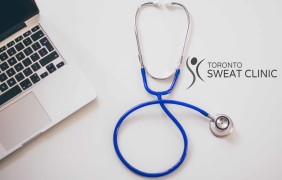 The sweaty, clammy, and sometimes dripping hand! For the past 10 years, I have been doing endoscopic thoracic sympathectomy (ETS) for many patients with these symptoms.
The sweaty, clammy, and sometimes dripping hand! For the past 10 years, I have been doing endoscopic thoracic sympathectomy (ETS) for many patients with these symptoms.
Many come to the office with a handkerchief in each hand, just to absorb all the sweat. When I welcome them into my office they avoid shaking my hand, and when I ask them to fill out some paperwork they leave the paper wrinkled and sometimes saturated with their sweat.
The impact of palmar hyperhidrosis can only be appreciated by those who suffer from it, but after many years of caring for these patients I understand how disabling it can be! Embarrassment, social isolation, low self esteem can result from poorly controlled hyperhidrosis. Many reject great career opportunities, while others shy away form intimate relationships.
As a thoracic surgeon I spend a good part of my week treating cancers of the lung and esophagus. I take many to the operating room and perform complex resections that can take many hours. Interestingly, those I operate on for hyperhidrosis seem to be more thankful and appreciative than those I cure of cancer. A shocking statement that illustrates the profound and devastating impact hyperhidrosis can have on otherwise well people.
When patients peruse the internet, they often read about the harm that ETS can cause. I would agree that, if patients are not properly selected, many will suffer from equally disabling side effects like compensatory hyperhidrosis. However, there are clear guidelines when choosing good candidates for ETS, which, if not followed can result in unhappy, regretful patients.
Ideal candidate for ETS are those that have focal sweating in the hands and/or underarms and/or feet. The rest of their body should sweat normally. They should not have any symptoms suggestive of hormonal imbalance like hyperthyroidism. The sweating should be severe, affecting them everyday. It is for this group that ETS can dramatically improve quality of life. Although 50% of patients will still have some form of compensatory sweating, the sweating is likely to be mild and very tolerable.
I love visiting my patients in the recovery room after their ETS. They are a bit groggy, but they have a subtle smirk on their face, as they rub their dry hands together for the first time in their lives. It is at this moment that I realize, time and time again, how fortunate I am that they allowed me to care for them.

